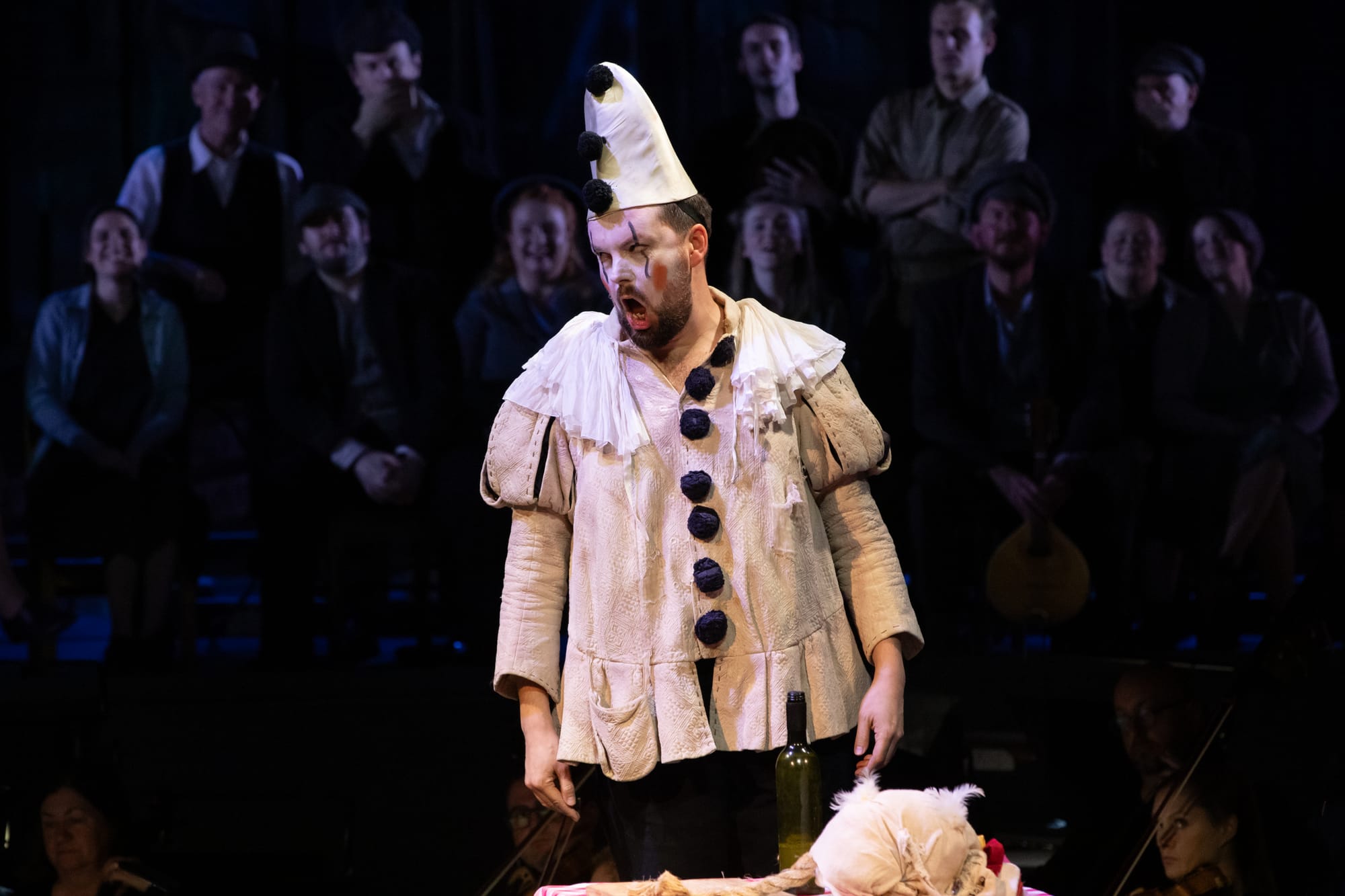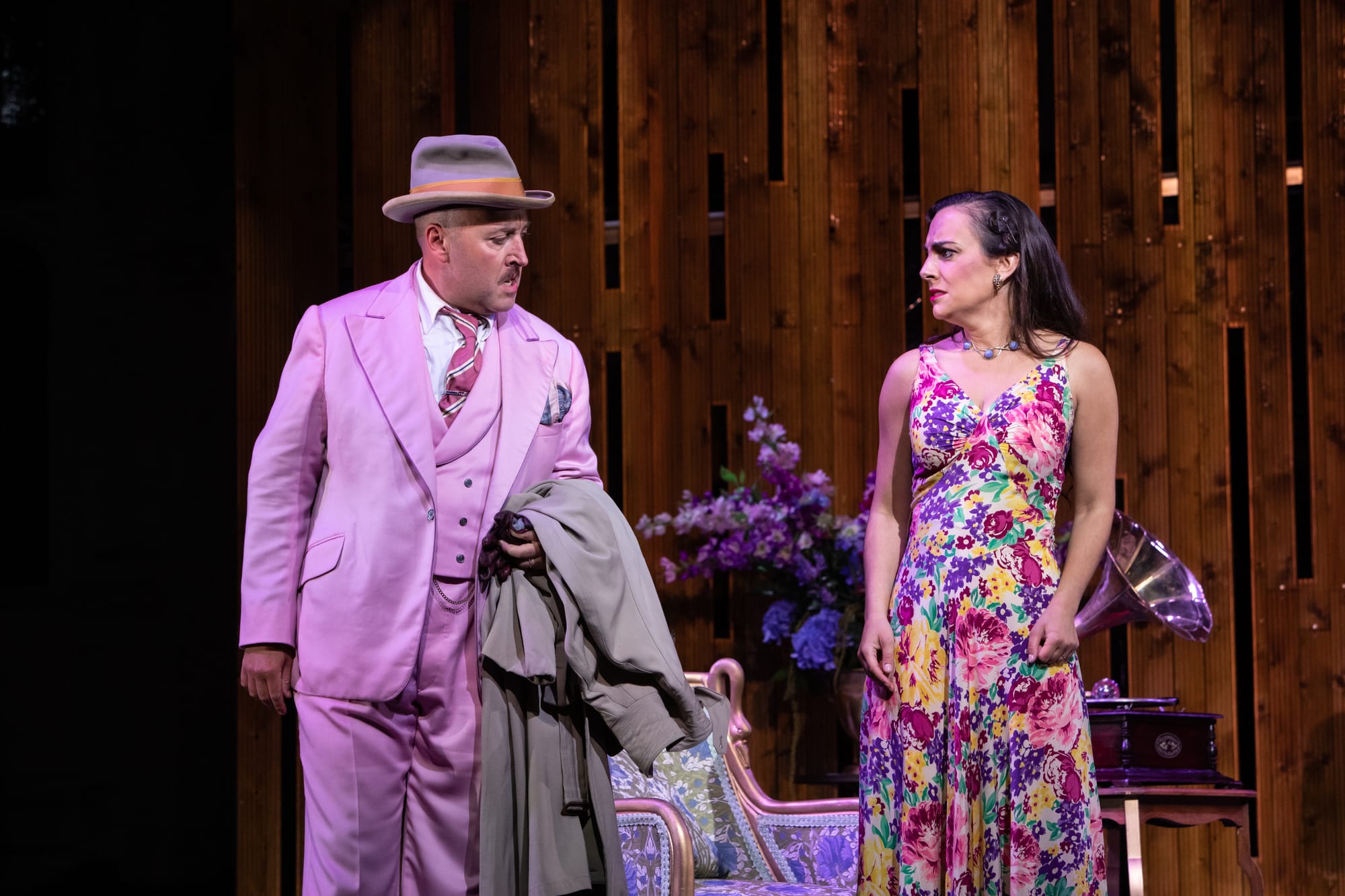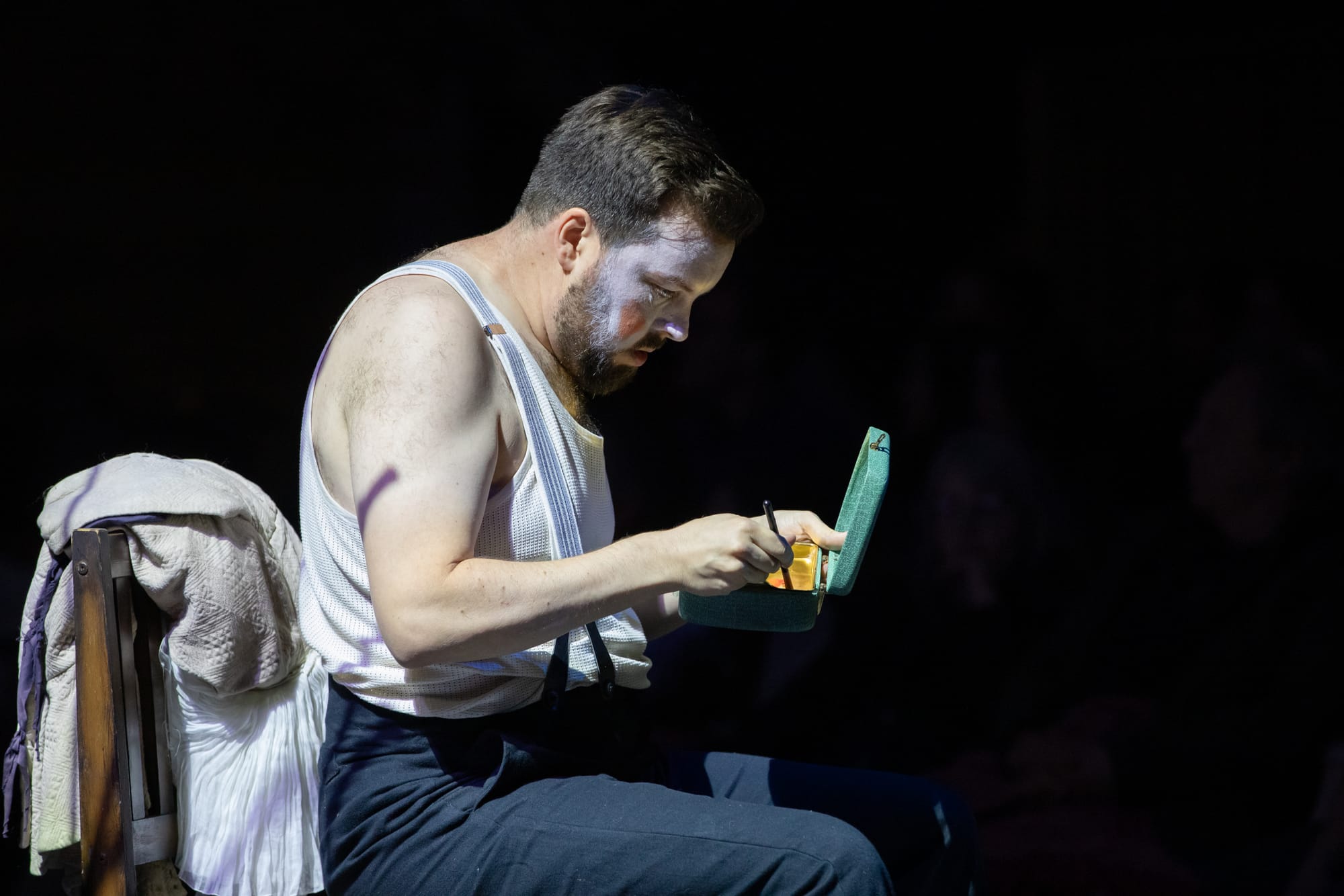
Wolf-Ferrari and Leoncavallo: Soloists; Children from Pimlico Musical Foundation; Chorus of Opera Holland Park; City of London Sinfonia / John Andrews (conductor, Wolf-Ferrari), Francesco Ciliuffo (conductor, Leoncavallo)
Wolf-Ferrari – Il segreto di Susanna
Production:
Director – John Wilkie
Designer – takis
Lighting Designer – Mark Jonathan
Cast:
Clare Presland – Countess Susanna
Richard Burkhard – Count Gil
John Savournin –Sante
Naomi Kilby & Kirsty McLean – Maid
Leoncavallo – Pagliacci
Production:
Director – Richard Lloyd-Evans
Designer – Bridget Kimak
Lighting Designer – Mark Jonathan
Intimacy and Fight Director – Haruka Kuroda
Cast:
David Butt Philip – Canio
Alison Langer – Nedda
Robert Hayward – Tonio
Zwakele Tshabalala – Beppe
A double helping of applause for the programming here: on the one hand, it is good to see Leoncavallo’s Pagliacci de-coupled from Mascagnji’s Cavalleria, and as we shall see, the choice of Susanna’s Secret offers much rich exchange of ideas; on the other, it is fascinating to see the Wolf-Ferrari again with a different partner (previously, in 2019, it shared an evening with Tchaikovsky’s wonderful Iolanta: review). That set of performances was to be, it turned out, OHP’s last pre-lockdown.
This new coupling worked brilliantly, and lt is also incredibly relevant. Addiction met domestic violence (an insert within the programme booklet sought to give advice for those ‘affected’ by issues in Pagliacci by pointing in the direction of the National Domestic Abuse Helpline – very much a sign of the times). Both take on the concept of sexual jealousy, in full-blooded verismo fashion for Pag, and with a far more gentle hand in Susanna.
For Il segreto di Susanna, Ermanno Wolf-Ferrari’s brilliantly deft one-cat Intermezzo (first performed in Munich in 1909), we heard the score in a reduction by Dan Jenkins (performed in arrangement with the publishers Josef Weinberger Limited) – reductions are becoming a regular part of the operatic scene these days, and they seem to crop up a lot at OHP Wolf-Ferrari’s score loses some of its lushness as a result, but luckily under the expert guidance of John Andrews, the loss felt minimal. Andres seemed to have the perfect tempi throughout.
Director John Wilkie’s production is brilliant. Costumes match otems on the set giving a nice sense of visual coherence, ad takis’ light designs support the idea of a comedy-drama within a nobleman’s house beautifully. A Comedy of Errors with more than a touch of Upstars, Downstairs is the vibe. The Countess Susanna’s secret. is, of course, that she smokes; but her husband suspects she has taken a lover. Three silent characters are added in John Wilkie’s production: a butler (John Savourin, brilliantly funny) and two charming, giggly maids (Naomi Kilby and Valerie Wong).
The OHP stage space is used well: we can even glimpse the ‘off-stage’ piano around Count Gil’s ‘Evitiam che un domestico’. It is all brilliantly slick, and the same could certainly be said of the City of London Sinfonia ‘s contribution under John Andrews.
Cast and conductor were broadly the same as in 2019 (one of the maids, Kirsty McLean, was replaced here by Valerie Wong). Savournin’s butler was fabulously funny, but it was Richard Burkhard’s Gil that stole the show
Clare Pressland was announced as having been ill in the days previously, and he assumption was somewhat sub-tha of 2019, occasionally too quiet and edgy. And yet her concluding aria, ‘Chi gioia la rube leggera,’ was truly touching, ensrined ina halo of stings and celesta, expertly marshalled by Andrews. Moments of magic.
It was though the Count of Richard Burkhard that dominated, Perhaps his most lovely moment was ‘Il dolce idillio’ (he initiates a glorious duet with the Countess). Andrews inspired the orchestra to their best (it was a close-un thing, but they sounded better in the Wolf-Ferrari than in the Leoncavallo); even the cruelly high and rapid violin lines succeeded; Andrews’ gestures confirmed his in-depth knowledge of the score.

Here’s that duet, with two major singers of yesteryear on an RCA 78-rpm record (89087, recorded February 21, 1912): Pasquale Amato (1878-1942) and Geraldine Farrar (1882-1967).
And so to Pagliacci. Set in 20th-century Italy (around the 1940s), the set conversion was clearly involved – hence the 35-minute plus interval (quite a late finish for hos heading across London). The reduction this time was by ‘Tony Burke @ Pocket Productions,’ whcih inevitably detracted a little from the power of the opening (those who know Serafin’s classic 1954 account will know what I mean here). Nevertheless, conductor Francesco Cilluffo found much subtlety in the scoring (ironically, he comes fresh from a Mascagni production at Wexford, although not Cav: instead, Le Maschere). If the City of London Sinfonia was a touch less ignited under his direction that under Andrews, there was much to enjoy, and, like, Andres, his tempi seemed perfectly chosen (more room for rubato in Pag, and Cilluffo judged it well).
The production plays with the idea of staging and audiences, which is logical as, like Richard Strauss’ Ariadne auf Naxos, we get both backstage and opera performances in one piece. So, the Prologue (Sì può) is performed to the on-stage audience. Later, teh ’real’ audience gets dragged into the action – the murder is performed off the OHP stage and within the audience space, adding to the sense of verismo.
It is surely luxury to have Robert Hayward as Tonio, properly threatening in his demeanour, his vocal strength undeniable (let’s not forget his recent Alberich Gotterdämmerung at the Festival Hall). Sporting a stick to indicate his disability, Hayward commanded the stage, his brutish actions visceral.
It takes a lot to top that, but enter David Butt Philip (who had actually sang also in the 2019 Iolanta, as Count Vaudemort, but here had the perfect chance to shine as Canio/Pagliacci). Butt Philip has it all: a range that implies there is more than a hint of the latter-day ‘baritenor’ about him, plus burnished high notes that must have been heard as far as Knightsbridge. Add to this superlative diction, and a ‘Vesti la giubba’ for the ages, and you get a performance to treasure.

Nedda was brilliantly portrayed by Alison Langer, who was the stand-out performer, as Gilda, in OHP’s 2023 Rigoletto (review). The Silvio, Harry Thatcher, took a while to warm into the role, but found his feet (luckily in time for a truly spine-tingling ‘Tutto scordiam’ with Langer), while Zwakele Tshabalala was a strong Beppe.
Opera Holland Park continues to go from strength to strength. After a miraculous, revelatory Puccini Edgar earlier in the season (review), this coupling continued the trend of vivid, spine-tingling opera. Next up on their schedule, Handel’s Acis and Galatea.









